最新仁爱版英语七年级下最全全部全部知识点总结
(完整版)仁爱版英语七年级下全部知识点总结.doc

七年级下英语知识点总结Unit 5 Topic1㈠短语总结1.在学校大门口 at the school gate2.来学校come to school3. 去学校go to school4. 上课have class / have classes5. 步行on foot6.骑自行车ride a bike/ ride bikes/ by bike / on a bike7.坐公交by bus / take a bus8.坐地铁by subway / take the subway / on the subway9.坐飞机by plane/ take the plane / on the plane10.坐小汽车by car / in a car/ take a car/ drive a car11. 坐轮船by ship12. 坐小船by boat13. 坐火车by train / on the train14. 在我们组in our group15.一群学生a group of students16.我们中的三个人 three of us17.在平日 on weekdays18.在周末 on the weekends / at weekends19.起床 get up20.睡觉 go to bed21.早起 get up early22.回家 go home23.到家 get home24.去动物园 go to the zoo25.去公园 go to the park26.看电影 see a movie / film27.看电视 watch TV28.在晚上 in the evening / at night29.帮助父母 help parents30.做某人的家庭作业 do one’s ( my/ her/ his/ your/ their)homework31.在学校 at school32.知道 ,了解 know about / learn about33.校园生活 school life34.一个美国学生 an American student35.在美国 in America / in the U.S.A.36.许多学生 many students/ a lot of students/ lots of students37.很少 very few38.吃午饭 have lunch39.出去吃饭 eat out40.在校期 on school days41.休息一会 have a short rest/ break42.午后 after lunch43.在某人的余 in one’s ( my/ his/ her/ their⋯)free/ spare time44.打球 play basketball45.踢足球 play soccer / football46.琴 play the piano47.吉他 play the guitar48.拉二胡 play erhu49.去游泳 go swimming / go for a swim50.去划船 go boating51.球 a ball game / ball games52.一年四次 four times a year53.听音 listen to music54.read books55.看 read newspapers56.看医生 see a doctor57.去 go to the library58.一周两次 twice a week59.朋友 meet friends60.每天 every day61.在七点半 at half past seven62.一小会 for a little while / for a short time63.晚后 after supper64.吃 have dinner65.吃早 have breakfast㈡重要句型1.I usually come to school by subway.同句 : I usually take the subway to school.划部分提 : How do you usually come to school?似的有:go to school by bike=go to schoolon a bike= ride a bike to school=ride to schoolgo home by bus=go home on a bus=take a bus home2.How do you usually/ often⋯?你通常 /常怎⋯?3.It ’stime for class.=It’s time to have class. =It’s time for having class.4.What about you? =How about you?5.How often ⋯? 率,回答可以用率副: always, usually, often,sometimes, seldom, never, every day ,every +其他名或表示率的短回答表示率的短:次数 +位e.g. : once a day / twice a week / three times a month6.The early bird catches the work. ( ) 笨先7.Work / Study must come first. 工作 / 学必放在第一位!8. Classes begin at eight. =Class begins at eight.提问:What time does the class begin? / What time do the classes begin?㈢重要单词的用法1.look (感官动词 ) 看起来,后面加形容词His mother looks very young.They look very cute.Her dress looks very nice.You look very cool in this coat.2. by 介词by 后面直接加表示交通工具的名词,中间不用任何词修饰,如: by bike by +动词 ing 形式,表示通过某种方式People show love to their mothers by giving cards.You can be a good student by working hard.3.over (形容词 ) School/ Class is over.4.begin现在分词 : beginning 过去式 : beganbegin to do sth , begin doing sthHe begins to write a letter. =He begins writing a letter.如果 begin 本身为分词,只能用begin to do sthHe is beginning to run.5.listen to 听(动作), hear 听见 (结果 )6.always 反义词 never7.本话题涉及的时态为一般现在时,句中常有频率副词或表示频率的短语,如果主语为三单,动词一定要用三单!(四)易错题1.You new watch ______ (look) very nice!2.Here ______(be) some news.3.Oh, come on! It’s time_____ going to school.4.They usually go to school on ________(feet).5.In my class, forty of _______(we) go to school by bike.6.The early bird ______ (catch) the worm.7.Kangkang often _____ (ride) a bike to the park.8.What time _____ (be)school over?9.Work must come ______(once).10.It ’stime ____you to get up.11.We often _____ books in the morning.12.Jill ’s friend like ______(study) in our school.13.Mr. Wang teaches ______(we) English. _____ of us like him.14.How about ______(go) out with me?15.Most students go to school _____ the school bus.16._______ do you go shopping with your mother?A. How soonB. How farC. How oftenD. How much17. What time do you usually get up _____ weekdays?18. He ______ busy, so he has no time to play with us.A. is alwaysB. seldom isC. always isD. often is19.The last class______(finish) at twelve o’clock.20.Let’s go______(boat).21.It’stime to have breakfast. 同(义句 )______________________________________________________.22.Michael often rides a bike to school. 同(义句 )______________________________________________________.23.I always go to work on foot. (对划线部分提问 )______________________________________________________.24.My mother goes shopping twice a week. 对(划线部分提问 )______________________________________________________.25.Mary always reads books in the library. 反(义句 )______________________________________________________.26.He usually does his homework at school.否(定句 )______________________________________________________.27.They often go to school by bus in the morning. 对(划线部分提问 ) ______________________________________________________.28.Jane seldom watches TV on weekdays改.(为一般疑问句 )______________________________________________________.29.He usually has lunch at home. 对(划线部分提问 )______________________________________________________.30.Li Ping often goes to work on foot. (同义句 )______________________________________________________.31.几乎没有学生乘地铁去学校。
(完整版)仁爱版七年级英语下册知识点总结
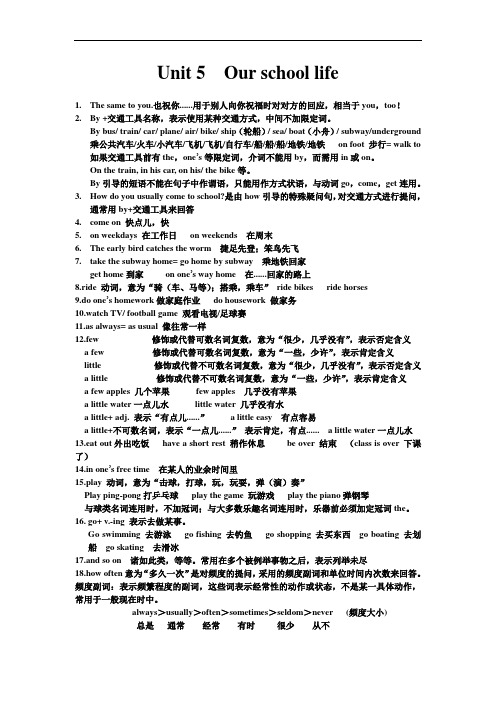
Unit 5 Our school life1.The same to you.也祝你......用于别人向你祝福时对对方的回应,相当于you,too!2.By +交通工具名称,表示使用某种交通方式,中间不加限定词。
By bus/ train/ car/ plane/ air/ bike/ ship(轮船)/ sea/ boat(小舟)/ subway/underground 乘公共汽车/火车/小汽车/飞机/飞机/自行车/船/船/船/地铁/地铁on foot 步行= walk to 如果交通工具前有the,one’s等限定词,介词不能用by,而需用in或on。
On the train, in his car, on his/ the bike等。
By引导的短语不能在句子中作谓语,只能用作方式状语,与动词go,come,get连用。
3.How do you usually come to school?是由how引导的特殊疑问句,对交通方式进行提问,通常用by+交通工具来回答e on 快点儿,快5.on weekdays 在工作日on weekends 在周末6.The early bird catches the worm 捷足先登;笨鸟先飞7.take the subway home= go home by subway 乘地铁回家get home到家on one’s way home 在......回家的路上8.ride 动词,意为“骑(车、马等);搭乘,乘车”ride bikes ride horses9.do one’s homework做家庭作业do housework 做家务10.watch TV/ football game 观看电视/足球赛11.as always= as usual 像往常一样12.few 修饰或代替可数名词复数,意为“很少,几乎没有”,表示否定含义a few 修饰或代替可数名词复数,意为“一些,少许”,表示肯定含义little 修饰或代替不可数名词复数,意为“很少,几乎没有”,表示否定含义a little 修饰或代替不可数名词复数,意为“一些,少许”,表示肯定含义a few apples 几个苹果few apples 几乎没有苹果a little water一点儿水little water 几乎没有水a little+ adj. 表示“有点儿......” a little easy 有点容易a little+不可数名词,表示“一点儿......”表示肯定,有点...... a little water一点儿水13.eat out外出吃饭have a short rest 稍作休息be over 结束(class is over 下课了)14.in one’s free time 在某人的业余时间里15.play 动词,意为“击球,打球,玩,玩耍,弹(演)奏”Play ping-pong打乒乓球play the game 玩游戏play the piano弹钢琴与球类名词连用时,不加冠词;与大多数乐趣名词连用时,乐器前必须加定冠词the。
仁爱版七年级下英语各单元知识点总结

七年级下英语知识点总结Unit 5 Topic1㈠短语总结1. 在学校大门口 at the school gate2. 来学校 come to school3. 去学校 go to school4. 上课 have class / have classes5. 步行 on foot6. 骑自行车 ride a bike/ ride bikes/ by bike / on a bike7. 坐公交 by bus / take a bus8. 坐地铁 by subway / take the subway / on the subway 9. 坐飞机 by plane/ take the plane / on the plane 10. 坐小汽车 by car / in a car/ take a car/ drive a car 11. 坐轮船 by ship 12. 坐小船 by boat13. 坐火车 by train / on the train 14. 在我们组 in our group15. 一群学生 a group of students 16. 我们中的三个人 three of us 17. 在平日 on weekdays18. 在周末 on the weekends / at weekends 19. 起床 get up 20. 睡觉 go to bed 21. 早起 get up early 22. 回家 go home 23. 到家 get home24. 去动物园 go to the zoo 25. 去公园 go to the park 26. 看电影 see a movie / film 27. 看电视 watch TV28. 在晚上 in the evening / at night 29. 援助父母 help parents30. 做某人的家庭作业 do one‘s ( my/ her/ his/ your/ their) homework 31. 在学校 at school32. 了解,了解 know about / learn about 33. 校园生活 school life34. 一个美国学生 an American student 35. 在美国 in America / in the U.S.A.36. 许多学生 many students/ a lot of students/ lots of students 37. 很少 very few 38. 吃午饭 have lunch 39. 出去吃饭 eat out40. 在校期间 on school days41. 休息一会 have a short rest / break 42. 午饭后 after lunch43. 在某人的业余时间in one‘s ( my/ his/ her/ their…)free/ spare time 44. 打篮球 play basketball 45. 踢足球play soccer / football 46. 弹钢琴 play the piano 47. 弹吉他play the guitar 48. 拉二胡 play erhu49. 去游泳 go swimming / go for a swim 50. 去划船 go boating51. 球赛 a ball game / ball games 52. 一年四次 four times a year 53. 听音乐 listen to music 54. 读书 read books55. 看报 read newspapers 56. 看医生 see a doctor57. 去图书馆 go to the library 58. 一周两次 twice a week 59. 见朋友 meet friends 60. 每天 every day61. 在七点半 at half past seven62. 一小会 for a little while / for a short time 63. 晚饭后 after supper 64. 吃饭 have dinner65. 吃早饭 have breakfast重点句型Happy New Year! The same to you.Your new bike looks very nice. Thank you.How do you usually come to school? —I usually come to school by subway. How often do you go to the library? —Once/Twice/Three times a week/Very often/Every day/Sedom The early bird catches the work. (谚语) 笨鸟先飞Work / Study must come first. 工作/ 学习必须放在第一位! Classes begin at eight. =Class begins at eight.What time does the class begin? / What time do the classes begin? We have no more time. 我们没有更多的时间了。
仁爱版英语七年级下全部知识点总结

仁爱版英语七年级下全部知识点总结集团文件版本号:(M928-T898-M248-WU2669-I2896-DQ586-M1988)七年级下英语知识点总结Unit 5 Topic1㈠短语总结1.在学校大门口 at the school gate2.来学校 come to school3.去学校 go to school4.上课 have class / haveclasses5.步行 on foot6.骑自行车 ride a bike/ ride bikes/by bike / on a bike7.坐公交 by bus / take a bus8.坐地铁 by subway / take thesubway / on the subway9.坐飞机 by plane/ take the plane/ on the plane10.坐小汽车 by car / in a car/ takea car/ drive a car11.坐轮船 by ship12.坐小船 by boat13.坐火车 by train / on the train14.在我们组 in our group15.一群学生 a group of students16.我们中的三个人 three of us 17.在平日 on weekdays18.在周末 on the weekends / atweekends19.起床 get up20.睡觉 go to bed21.早起 get up early22.回家 go home23.到家 get home24.去动物园 go to the zoo25.去公园 go to the park26.看电影 see a movie / film27.看电视 watch TV28.在晚上 in the evening / at night29.帮助父母 help parents30.做某人的家庭作业 do one’s ( my/her/ his/ your/ their)homework31.在学校 at school32.知道,了解 know about / learn about33.校园生活 school life34.一个美国学生 an American student35.许多学生 many students/ a lot ofstudents/ lots of students36.很少 very few37.吃午饭 have lunch38.出去吃饭 eat out39.在校期间 on school days40.休息一会 have a short rest/ break41.午饭后 after lunch42.在某人的业余时间in one’s ( my/his/ her/ their…)free/ spare time43.打篮球 play basketball44.踢足球play soccer / football45.弹钢琴 play the piano46.弹吉他play the guitar47.拉二胡 play erhu48.去游泳 go swimming / go for a swim49.去划船 go boating50.球赛 a ball game / ball games 51.一年四次 four times a year52.听音乐 listen to music53.读书 read books54.看报 read newspapers55.看医生 see a doctor56.去图书馆 go to the library57.一周两次 twice a week58.见朋友 meet friends59.每天 every day60.在七点半 at half past seven61.一小会 for a little while / for ashort time62.晚饭后 after supper63.吃饭 have dinner64.吃早饭 have breakfast㈡重要句型1.I usually come to school by subway.同义句: I usually take the subway to school.对划线部分提问: How do you usually come to school?类似的有:go to school by bike=go to schoolon a bike= ride a bike toschool=ride to schoolgo home by bus=go home on abus=take a bus home2.How do you usually/ often…?你通常/经常怎样…?3.It’s time for class.=It’s time tohave class. =It’s time for havingclass.4.What about you? =How about you?5.How often …? 询问频率,回答可以用频率副词:always, usually, often,sometimes, seldom, never, everyday ,every +其他时间名词或表示频率的短语回答表示频率的短语:次数+单位时间e.g. : once a day / twice a week / three times a month6. The early bird catches the work.(谚语) 笨鸟先飞7. Work / Study must come first. 工作/ 学习必须放在第一位!8. Classes begin at eight. =Class begins at eight.提问: What time does the class begin? / What time do the classes begin?㈢重要单词的用法1.look (感官动词) 看起来,后面加形容词His mother looks very young.They look very cute.Her dress looks very nice.You look very cool in this coat.2.by 介词by 后面直接加表示交通工具的名词,中间不用任何词修饰,如:by bikeby +动词ing形式,表示通过某种方式People show love to their mothers by giving cards.You can be a good student by working hard.3.over (形容词)School / Class is over.4.begin现在分词: beginning 过去式: beganbegin to do sth , begin doing sthHe begins to write a letter. =He begins writing a letter.如果begin本身为分词,只能用begin to do sthHe is beginning to run.5.listen to 听(动作), hear 听见(结果)6.always 反义词 never7.本话题涉及的时态为一般现在时,句中常有频率副词或表示频率的短语,如果主语为三单,动词一定要用三单!(四)易错题1.You new watch ______ (look) verynice!2.Here ______(be) some news.3.Oh, come on! It’s time_____ goingto school.4.They usually go to school on________(feet).5.In my class, forty of _______(we)go to school by bike.6.The early bird ______ (catch) theworm.7.Kangkang often _____ (ride) a biketo the park.8.What time _____ (be)school over?9.Work must come ______(once).10.It’s time ____you to get up.11.We often _____ books in the morning.12.Jill’s friend like ______(study)in our school.13.Mr. Wang teaches ______(we) English._____ of us like him.14.How about ______(go) out with me?15.Most students go to school _____the school bus.16._______ do you go shopping withyour mother?A. How soonB. How farC.How often D. How much17.What time do you usually get up_____ weekdays?18.He ______ busy, so he has no timeto play with us.A. is alwaysB. seldom isC. always isD. often is19. The last class______(finish) at twelve o’clock.20. Let’s go______(boat).21. It’s time to have breakfast. (同义句)______________________________________ ________________.22. Michael often rides a bike to school. (同义句)______________________________________ ________________.23. I always go to work on foot. (对划线部分提问)______________________________________ ________________.24. My mother goes shopping twice a week. (对划线部分提问)______________________________________ ________________.25. Mary always reads books in the library. (反义句)______________________________________ ________________.26. He usually does his homework at school. (否定句)______________________________________________________.27. They often go to school by bus in the morning. (对划线部分提问)______________________________________________________.28. Jane seldom watches TV on weekdays. (改为一般疑问句)______________________________________________________.29. He usually has lunch at home. (对划线部分提问)______________________________________________________.30. Li Ping often goes to work on foot. (同义句)______________________________________________________.31. 几乎没有学生乘地铁去学校。
七年级下册英语仁爱版知识点总结
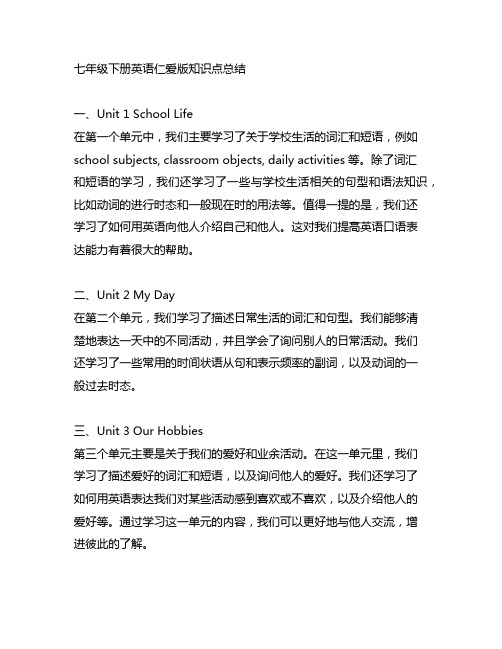
七年级下册英语仁爱版知识点总结一、Unit 1 School Life在第一个单元中,我们主要学习了关于学校生活的词汇和短语,例如school subjects, classroom objects, daily activities等。
除了词汇和短语的学习,我们还学习了一些与学校生活相关的句型和语法知识,比如动词的进行时态和一般现在时的用法等。
值得一提的是,我们还学习了如何用英语向他人介绍自己和他人。
这对我们提高英语口语表达能力有着很大的帮助。
二、Unit 2 My Day在第二个单元,我们学习了描述日常生活的词汇和句型。
我们能够清楚地表达一天中的不同活动,并且学会了询问别人的日常活动。
我们还学习了一些常用的时间状语从句和表示频率的副词,以及动词的一般过去时态。
三、Unit 3 Our Hobbies第三个单元主要是关于我们的爱好和业余活动。
在这一单元里,我们学习了描述爱好的词汇和短语,以及询问他人的爱好。
我们还学习了如何用英语表达我们对某些活动感到喜欢或不喜欢,以及介绍他人的爱好等。
通过学习这一单元的内容,我们可以更好地与他人交流,增进彼此的了解。
四、Unit 4 Celebrations第四个单元主要是关于庆祝活动。
我们学习了描述不同庆祝活动的词汇和短语,以及询问别人关于庆祝活动的相关问题。
我们还学习了一些关于时间的表达方式,比如日期、星期、月份等。
我们还学习了一些关于情感的形容词,以及表示祝福的句型和短语。
五、Unit 5 The World Around Us在第五个单元中,我们学习了描述环境和自然现象的词汇和短语,以及相关的句型和语法知识。
我们可以用英语描述不同的自然现象,比如天气、季节等,也能够表达对自然环境的关心和热爱。
除了这些,我们还学习了一些关于地点和方位的词汇,以及表示允许和禁止的句型和短语。
六、Unit 6 Amazing Stories在第六个单元中,我们学习了一些关于神话故事和传奇人物的词汇和短语。
仁爱版英语七年级下全部知识点总结

仁爱版英语七年级下全部知识点总结七年级下英语知识点总结Unit 5 Topic1㈠短语总结1.在学校大门口at the school gate2.来学校come to school3.去学校go to school4.上课have class / have classes5.步行on foot6.骑自行车ride a bike/ ride bikes/ by bike /on a bike7.坐公交by bus / take a bus8.坐地铁by subway / take the subway /on the subway9.坐飞机by plane/ take the plane / on theplane10.坐小汽车by car / in a car/ take a car/drive a car11.坐轮船by ship12.坐小船by boat13.坐火车by train / on the train14.在我们组in our group15.一群学生 a group of students16.我们中的三个人three of us17.在平日on weekdays18.在周末on the weekends / at weekends19.起床get up20.睡觉go to bed21.早起get up early22.回家go home23.到家get home24.去动物园go to the zoo25.去公园go to the park26.看电影see a movie / film27.看电视watch TV28.在晚上in the evening / at night29.帮助父母help parents30.做某人的家庭作业do one’s ( my/ her/ his/your/ their)homework31.在学校at school 32.知道,了解know about / learn about33.校园生活school life34.一个美国学生an American student35.在美国in America / in the U.S.A.36.许多学生many students/ a lot of students/lots of students37.很少very few38.吃午饭have lunch39.出去吃饭eat out40.在校期间on school days41.休息一会have a short rest/ break42.午饭后after lunch43.在某人的业余时间in one’s ( my/ his/ her/their…)free/ spare time44.打篮球play basketball45.踢足球play soccer / football46.弹钢琴play the piano47.弹吉他play the guitar48.拉二胡play erhu49.去游泳go swimming / go for a swim50.去划船go boating51.球赛a ball game / ball games52.一年四次four times a year53.听音乐listen to music54.读书read books55.看报read newspapers56.看医生see a doctor57.去图书馆go to the library58.一周两次twice a week59.见朋友meet friends60.每天every day61.在七点半at half past seven62.一小会for a little while / for a short time63.晚饭后after supper64.吃饭have dinner65.吃早饭have breakfast㈡重要句型1.I usually come to school by subway.同义句: I usually take the subway to school.对划线部分提问: How do you usually come to school?类似的有:go to school by bike=go to schoolon a bike= ride a bike to school=ride to schoolgo home by bus=go home on a bus=take abus home2.How do you usually/ often…?你通常/经常怎样…?3.It’s time for class.=It’s time to have class.=It’s time for having class.4.What about you? =How about you?5.How often …? 询问频率,回答可以用频率副词:always, usually, often, sometimes, seldom, never, every day ,every +其他时间名词或表示频率的短语回答表示频率的短语:次数+单位时间e.g. : once a day / twice a week / three times a month6. The early bird catches the work. (谚语) 笨鸟先飞7. Work / Study must come first. 工作/ 学习必须放在第一位!8. Classes begin at eight. =Class begins at eight. 提问:What time does the class begin? / What time do the classes begin?㈢重要单词的用法1.look (感官动词) 看起来,后面加形容词His mother looks very young.They look very cute.Her dress looks very nice.You look very cool in this coat. 2.by 介词by 后面直接加表示交通工具的名词,中间不用任何词修饰,如:by bikeby +动词ing形式,表示通过某种方式People show love to their mothers by giving cards.You can be a good student by working hard.3.over (形容词)School / Class is over.4.begin现在分词: beginning 过去式: beganbegin to do sth , begin doing sthHe begins to write a letter. =He begins writing a letter.如果begin本身为分词,只能用begin to do sthHe is beginning to run.5.listen to 听(动作),hear 听见(结果)6.always 反义词never7.本话题涉及的时态为一般现在时,句中常有频率副词或表示频率的短语,如果主语为三单,动词一定要用三单!(四)易错题1.You new watch ______ (look) very nice!2.Here ______(be) some news.3.Oh, come on! It’s time_____ going to school.4.They usually go to school on ________(feet).5.In my class, forty of _______(we) go to schoolby bike.6.The early bird ______ (catch) the worm.7.Kangkang often _____ (ride) a bike to thepark.8.What time _____ (be)school over?9.Work must come ______(once).10.It’s time ____you to get up.11.We often _____ books in the morning.12.Jill’s friend like ______(study) in our school.13.Mr. Wang teaches ______(we) English. _____of us like him.14.How about ______(go) out with me?15.Most students go to school _____ the schoolbus.16._______ do you go shopping with yourmother?A. How soonB. How farC. Howoften D. How much17.What time do you usually get up _____weekdays?18.He ______ busy, so he has no time to playwith us.A. is alwaysB. seldom isC. always isD. often is19. The last class______(finish) at twelve o’clock.20. Let’s go______(boat).21. It’s time to have breakfast. (同义句)_________________________________________ _____________.22. Michael often rides a bike to school. (同义句)_________________________________________ _____________.23. I always go to work on foot. (对划线部分提问)_________________________________________1_____________.24. My mother goes shopping twice a week. (对划线部分提问)_________________________________________ _____________.25. Mary always reads books in the library. (反义句)_________________________________________ _____________.26. He usually does his homework at school. (否定句)_________________________________________ _____________.27. They often go to school by bus in the morning. (对划线部分提问)_________________________________________ _____________.28. Jane seldom watches TV on weekdays. (改为一般疑问句)_________________________________________ _____________.29. He usually has lunch at home. (对划线部分提问)_________________________________________ _____________.30. Li Ping often goes to work on foot. (同义句) _________________________________________ _____________.31. 几乎没有学生乘地铁去学校。
(仁爱版)英语七年级下册知识点归纳与总结
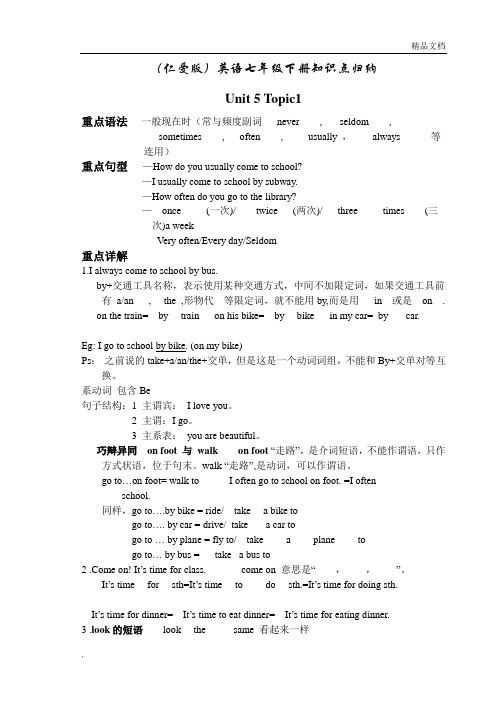
(仁爱版)英语七年级下册知识点归纳Unit 5 Topic1重点语法一般现在时(常与频度副词___never____, ___seldom____,___sometimes____,___often____, ___usually_,____always______等连用)重点句型—How do you usually come to school?—I usually come to school by subway.—How often do you go to the library?—__once_____(一次)/____twice___(两次)/___three ___times____(三次)a weekVery often/Every day/Seldom重点详解1.I always come to school by bus.by+交通工具名称,表示使用某种交通方式,中间不加限定词,如果交通工具前有_a/an___, __the_,形物代_ 等限定词,就不能用by,而是用___in__或是__on__.on the train=__by__ train on his bike=__by__ bike in my car=_by___ car.Eg: I go to school by bike. (on my bike)Ps:之前说的take+a/an/the+交单,但是这是一个动词词组,不能和By+交单对等互换。
系动词包含Be句子结构:1 主谓宾:I love you。
2 主谓:I go。
3 主系表:you are beautiful。
巧辩异同on foot 与walk on foot “走路”,是介词短语,不能作谓语,只作方式状语,位于句末。
walk “走路”,是动词,可以作谓语。
go to…on foot= walk to I often go to school on foot. =I often ________school.同样,go to….by bike = ride/__take__ a bike togo to…. by car = drive/_take___ a car togo to … by plane = fly to/__take__ __a__ __plane__ __to__go to… by bus =___take_ a bus to2 .Come on! It’s time for class. come on 意思是“____,____,____”。
(完整版)仁爱英语七年级下册重要知识点和语法点归纳,推荐文档

Unit 5 Our School Lifetopic1How do you go to school?一、重点词语:1. wake up醒来,唤醒get up起床2. go to school去上学go home 回家3. go dancing / shopping / skating / swimming去跳舞;购物、滑冰;游泳go doing something可用于表达去进行某种娱乐休闲活动。
4.表示交通方式:on foot步行by boat坐船by ship坐船by air乘飞机by plane乘飞机by train坐火车by subway搭乘地铁by car坐小汽车by bus坐公共汽车by bike骑自行车5. take the subway / bus / car搭乘地铁;公共汽车;小汽车6. drive a car to work = go to work by car驾车去上班take a bus to work = go to work by bus乘公共汽车去上班go to school on foot = walk to school步行去上学7. ride a bike / horse骑自行车;骑马8. after school / class放学以后;下课以后9. play the piano / guitar / violin弹钢琴;吉他;小提琴play basketball / soccer / football打篮球;踢足球;打橄榄球play computer games玩电脑游戏play with a computer玩电脑play sports做运动10. next to紧挨着,在⋯旁边11. a plan of my school一幅我们学校的平面图12. on weekdays在工作日at weekends在周末13. have breakfast / lunch / supper / dinner / meals吃早餐;中餐;晚餐;正餐;一日三餐have classes / lessons / a meeting上课;上课;开会14. watch TV / movies / games / the animals看电视;电影;比赛;动物read novels / newspapers / books看小说;报纸;书15. wash one ’s face / clothes洗脸;衣服16. 反义词: up – down, early– late近义词:quickly– fastget up early早起be late for迟到17. the first / second / third / fourth day第一;二;三;四天18. clean the house打扫房子19.表示建筑物(尤其学校建筑物):on the playground在操场at school / home / table在学校;家里;桌旁in a computer room / teachers’ office / classroom building / gym / library / lab / canteen在电脑室;教师办公室;教学楼;体操馆;图书馆;实验室;食堂20. around six o’clock = at about six o’clock大约在六点21. 频率副词: never, seldom, sometimes, often, usually, always二、重点句型:1.It’s time to get up.该起床的时候了。
仁爱版七年级下册英语复习知识点
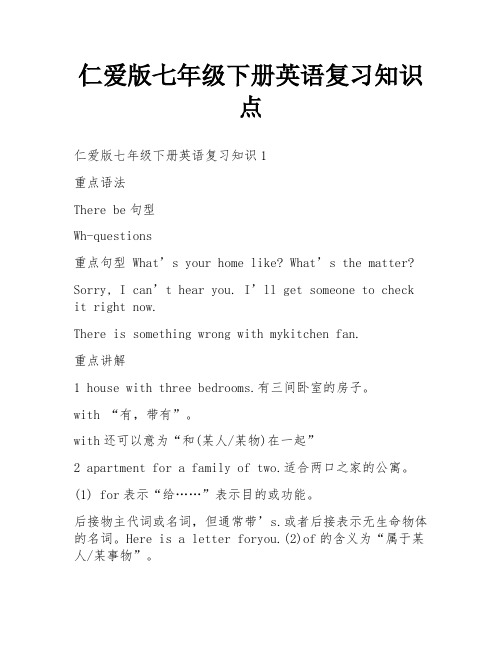
仁爱版七年级下册英语复习知识点仁爱版七年级下册英语复习知识1重点语法There be句型Wh-questions重点句型What’s your home like? What’s the matter?Sorry, I can’t hear you. I’ll get someone to check it right now.There is something wrong with mykitchen fan.重点讲解1 house with three bedrooms.有三间卧室的房子。
with “有,带有”。
with还可以意为“和(某人/某物)在一起”2 apartment for a family of two.适合两口之家的公寓。
(1) for表示“给……”表示目的或功能。
后接物主代词或名词,但通常带’s.或者后接表示无生命物体的名词。
Here is a letter foryou.(2)of的含义为“属于某人/某事物”。
She is a friend of Lily’s. = She is Lily’s friend.3 What’s the matter?怎么了?该句常用来询问某或某物出了什么什么问题或毛病;询问具体某人或某物出了什么问题时,还可以表达为:What’s the matter with sb./sth.某人或某物出了什么毛病。
What’s the matter? = What’swrong?4 Ihear you playing the piano.我听见你在弹钢琴。
hear…doing sth.“听见……在做某事”,强调正在进行的动作。
hear…dosth.“听见……做了某事”,强调全过程。
hearabout sth.听到关于某事物的消息 hear from sb.接到某人的来信、电话等hear of sb./sth.听到或知道某人或某事物的情况5 a lot of = lots of许多后接可数名词,相当于many;后接不可数名词,相当于much,用于肯定句中;但是注意:如果是否定句,则常用many或much.6 be far from… 离……远(抽象距离)be…away from…离……远(具体距离)My school is not far from thebookstore. The sea is 2 miles away fromthe hotel.7 There is something wrong with sb./sth.某人或某物出问题/有毛病了。
仁爱版英语七年级下最全全部全部知识点总结
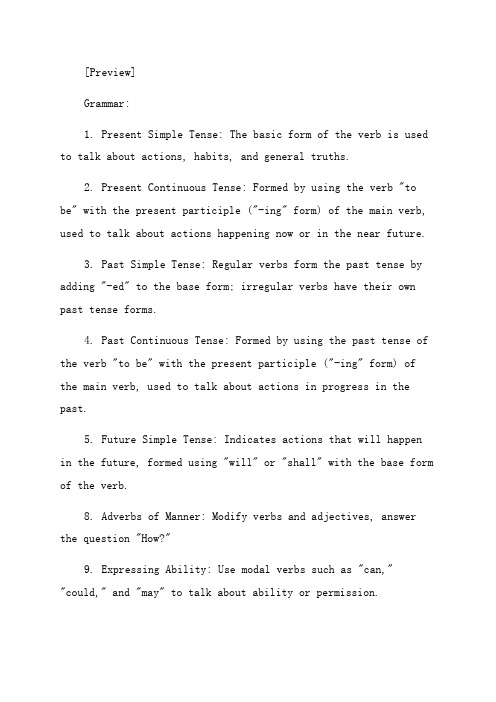
[Preview]Grammar:1. Present Simple Tense: The basic form of the verb is used to talk about actions, habits, and general truths.2. Present Continuous Tense: Formed by using the verb "to be" with the present participle ("-ing" form) of the main verb, used to talk about actions happening now or in the near future.3. Past Simple Tense: Regular verbs form the past tense by adding "-ed" to the base form; irregular verbs have their own past tense forms.4. Past Continuous Tense: Formed by using the past tense of the verb "to be" with the present participle ("-ing" form) of the main verb, used to talk about actions in progress in the past.5. Future Simple Tense: Indicates actions that will happen in the future, formed using "will" or "shall" with the base form of the verb.8. Adverbs of Manner: Modify verbs and adjectives, answer the question "How?"9. Expressing Ability: Use modal verbs such as "can," "could," and "may" to talk about ability or permission.10. Articles: "A," "an," and "the" are used to indicate whether a noun is specific or nonspecific.11. Prepositions: Words that show the relationship between a noun/pronoun and other words in a sentence.Vocabulary:2. Verbs and Adjectives: Actions, feelings, descriptions, etc.4. Hobbies and Sports: Vocabulary related to leisure activities and sports.5. Jobs and Professions: Vocabulary related to different occupations.6. Places: Vocabulary related to different locations and buildings.8. Environment: Vocabulary related to nature, pollution, and conservation.Reading:2. Skimming and Scanning: Techniques for quickly locating information in a text.3. Inferred Meaning: Inferring information from context clues.4. Making Inferences: Drawing conclusions based on information provided.5. Critical Thinking: Analyzing and evaluating text to form opinions and make judgments.Listening:2. Listening for Specific Information: Identifying key details or specific information in spoken English.3. Understanding Dialogue: Listening to conversations and understanding the roles and intentions of the speakers.4. Listening for Inferred Meaning: Inferring informationthat is not explicitly stated from the context.Speaking:1. Dialogue Practice: Engaging in conversations with classmates or teachers to practice spoken English.3. Pronunciation: Practicing correct pronunciation of words and sounds.4. Fluency: Developing the ability to speak English smoothly and confidently.Writing:1. Sentence Structure: Writing sentences with proper grammar and word order.2. Paragraph Writing: Organizing ideas and writing coherent paragraphs.3. Descriptive Writing: Using adjectives and sensorylanguage to describe people, places, and things.4. Narrative Writing: Writing stories with a clear beginning, middle, and end.5. Letter Writing: Understanding the format and structure of formal and informal letters.7. Editing and Proofreading: Correcting errors in spelling, grammar, punctuation, and sentence structure.。
仁爱科普版英语七年级下册英语全册知识点精讲
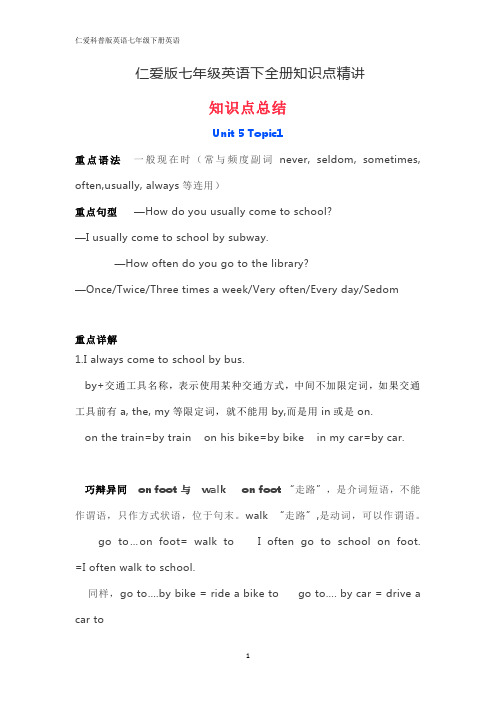
仁爱版七年级英语下全册知识点精讲知识点总结Unit 5 Topic1重点语法一般现在时(常与频度副词never, seldom, sometimes, often,usually, always等连用)重点句型—How do you usually come to school?—I usually come to school by subway.—How often do you go to the library?—Once/Twice/Three times a week/Very often/Every day/Sedom重点详解1.I always come to school by bus.by+交通工具名称,表示使用某种交通方式,中间不加限定词,如果交通工具前有a, the, my等限定词,就不能用by,而是用in或是on.on the train=by train on his bike=by bike in my car=by car.巧辩异同on foot 与walk on foot “走路”,是介词短语,不能作谓语,只作方式状语,位于句末。
walk “走路”,是动词,可以作谓语。
go to…on foot= walk to I often go to school on foot. =I often walk to school.同样,go to….by bike = ride a bike to go to…. by car = drive a car togo to … by plane = fly to go to… by bus = take a bus to 2 .Come on! It’s time for class. come on “快点,加油,来吧”。
It’s time for sth. “该做某事了”,与 It’s time to do sth.意思一样。
仁爱版英语七年级下册知识点归纳(完整版)

仁爱版英语七年级下册知识点归纳(完整版)-CAL-FENGHAI-(2020YEAR-YICAI)_JINGBIAN仁爱版英语七年级下册知识点归纳?英语七年级下册知识点归纳Unit?5?Topic1?重点语法一般现在时(常与频度副词never,?seldom,?sometimes,?often ,usually,?always等连用)重点句型?—How?do?you?usually?come?to?school???—I?usually?come?to?school?by?subway.????????????—How?often?do?you?go?to?the?library????—Once/Twice/Three?times?a?week/Very?often/Every?day/Seldom重点详解1I?always?come?to?school?by?bus.???by+交通工具名称,表示使用某种交通方式,中间不加限定词,如果交通工具前有a,?the,?my?等限定词,就不能用by,而是用in或是on.???on?the?train=by?train???on?his?bike=by?bike???in?my?car=by?car.???巧辩异同on?foot?与?walk????on?foot?“走路”,是介词短语,不能作谓语,只作方式状语,位于句末。
??walk?“走路”,是动词,可以作谓语。
? ? ??go?to…on?foot=?walk?to? ? ???I?often?go?to?school?on?foot.?=I?often?walk?to?school.?????同样,go?to….by?bike?=?ride?a?bike?to?????? ? ? ? ? go?to….?by?car?=?drive?a?car?to????????? ??go?to?…?by?plane?=?fly?to????????? ? ? ? ? go?to…?by?bus?=?take?a?bus?to2???Come?on!?It’s?time?for?class.???????come?on?“快点,加油,来吧”。
(完整)仁爱版英语七年级下册知识点归纳,推荐文档

仁爱版英语七年级下册知识点归纳Unit 5 Our School LifeTopic 1how do you usually go to school ?1. . at the school gate 在学校大门口2. . Happy New Year! 新年快乐3. . The same to you! 也同样祝你 --- ---4. . looks very nice! 看起来漂亮5. . come to school 来上学6. . come by bike= r i de( s) a bike 骑自行车7. . go by subway=take( s) the subway= in a subway 乘地铁8. . go by bus=take ( s) a bus / in a bus / on a bus 乘 公 共汽车9.. by plane / by air / in a plane / on a plane 乘 飞 机10. . by car / in a car / take a car 坐小汽车11. . by t rain / in a t rain / on a t rain / take a t rain 乘 火 车 12.. by ship/ by boat / on a ship/ boat / take the ship 坐 船13.. go on foot=walk to 步行40. .l isten to music 听音乐41. . read books看书42. . go to the park去公园43. . go to the zoo 去动物园 44. . go to the l ibrary 去 45. . go to school 去上学 46. . go to work去上班47. . school is over放学了48. . class is over 下课了 49. . in one`s free/ spare t i me 在某人的业余时间里 50. . play basketball打篮球视庭作业19. . want to do sth 想要做某事 20. . what t i me 什么时间 21. . get up 起 床 22. . on weekdays 周末 23. . at about six o`clock 在大约六点钟ss59. . how often多久一次 60. .ball games 球赛61. . have ball games 举行球赛 62. . four t imes a year 每年四次 63. . meet friends 见朋友 64. . once a week 每周一次 65. . twice a week 每周两次 66. . three t imes a week每周三次67. . Work must come f i rst! 工作( 学习) 必须放在第一 68. . twenty past six 六点过二十分 69. . at twenty past six 在六点二十分 70.. have / has breakfast吃早餐71. . have / has lunch 吃午餐 72. . have / has supper 吃晚餐 73. . have / has dinner 吃晚餐 74. . half past seven 七点半 75. . 五分a quarter past f ive五点过十76. . get home 到 家 77. . go / goes to bed 上床睡觉 78.. a quarter to ten 十点过十五分38 . after class下课后79 . drive a car 开小汽车 39 . after school 放学后80 . the Great Wall 长城1..Topic 2 He is playing soccer on the playground2. . dining hall 食堂Computer room电脑室3. .teachers` office教师办公24. . come on 快点 25. . 课了 I t `s t ime for class 该上 26.. I t `s t ime to have clas 该上课了 27. . know about -了解 的情况 28. . school l i fe 学校生活29. . 学生 American students美国30. . take a yellow school bu 乘一辆黄色的校车31. . have/ has lunch 吃午餐32. . at school在学校, 在上学33. . eat out 外出吃饭, 上馆子34.. 期间on school days 在校35. .have a short rest休息一会儿 36 .after lunch 午餐后 37 . after supper/ after dinner 晚饭后14. . 上学 walk to school 走路15. . watch TV 看电16. .do one`s homework 做家 17. . see a movie 看电影18. . 好Good evening 晚上51. . play soccer 踢足球 52. . go swimming去游泳53. . go shopping 去买东西 54. . go f ishing去钓鱼55.. go skating 去滑旱冰 56. . go skiing 去滑冰 57. .mountains go climbing 去爬ft58. . go hiking 去远足室4.. classroom building 教学楼5. .swimming pool 游泳池6.. in the l ibrary在图书馆7.. in the dormitory 在宿舍里8.. in the dininghall 在食堂里9.. on theplayground 在操场上10.. at the moment= now 此刻,现在11.. clean thedormitory 打扫宿舍12.. clean thebedroom 打扫卧室13.. clean theclassroom 打扫教室14.. clean theblackboard 擦黑板15.. make cards 制作卡片16.Would you l iketo----------------------------------- ?你想做------------ 吗?17.. Good idea!好主意18.. See you soon 一会儿见19.. play computer games玩电脑游戏20.. May I borrow --- ---我可以借------------ 吗?21.. a few 几个,一些22.. Ren’ ai ProjectEnglish workbooks 仁爱英语练习册23.. of course = sure =certainly 当然24.. on t i me 准时25.. in t i me 及时26.. many students 许多学生27.. do well in= begood at sth / doing sth 在--------- 做得好28.. do better in 在做得更好29.. on the shelf 在书架上30.. return = give back归还31.. I t ’s a pleasure 不用谢32.. Thank you allthe same 还是要谢谢你33.. lost and found 失物招领处34.. looking for 寻找35.. some money一些钱36 . a picture ofmy family 一张全家福照片37 . thank you allthe same 还是要谢谢你38. school student card 学生卡39. a pair of pants 一条裤子40.. a pair of shoes 一双鞋41.. two pairs ofshoes 两双鞋42 . singing inthe room 在房间里唱歌43 . dancing in the gym 在体育馆跳舞44 . swimming in the gym 在体育馆游泳45 . show sb around 带领某人参观46.. in the center of= in the middle of在--- --- 的中间,在 ------------ 的中央47.. on the left 在左边48.. on the r ight在右边49.. next to -------------------------- 在--- ---隔壁,在旁边,紧挨看,靠近67.. in the classroom 在教室里68.. in the office 在办公室里50.. at the back of --------------- 在--- ---后部,在后面51.. near the playground 在操场的附近52.. in the gym 在体育馆里,在健身房里53.. in the swimming pool 在游泳池里54.. talk about their families谈论他们的家庭55.. Attention,please ! 请注意!56 . between --- --- and --- --- 在----------- 和----------- 之间57.. stamp collection show集邮展58.. school hall 学校大厅59.. every Saturday 每个星期六60.. he is running 他在跑步61. . in picture 1 在第一张照片里62. . in picture 2 在第二张照片里63. .兴look( looks) happy 看起来高64.. love swimming 喜欢游泳65.. talk to a Japanese girl和一个日本女孩交谈66.. play the guitar 弹吉它69.. in the dormitory 在宿舍里70.. on the playground 在操场Topic 3 our school is very interesting1 .What day 用来提问“星期几”2 .have a music class 上一节音乐课3.. at ten o`clock 十点钟4.. a quarter to eleven 十点四十五分5 .have a biology lesson上一节生物课6 .have ageography 上一节地理课7 .have a P. E. lesson 上一节体育课8. .节美术课have an art lesson 上一9. .活动outdoor activities 户外10.. how many lessons多少节课26.. In the morning 在上午,在早晨11. . everyweek 每周12 . singingand da ncing 唱歌跳舞13 . drawing pictures 画画14. .problems Working on math 做数学题15.. speaking English说英语16.. learning about the past了解过去17.. an English book 一本英语书18.. What do you think of i t = How do you l ike i t ? 你觉得它怎么样?19. Difficult and boring 难学而且乏味43 .20. Which subject 哪一门课44 .21. Easy and interesting 容易又有趣45 .22. Favorite subject 最喜欢的科目46 .23. My school l i fe 我的学校生活47 .24. At school 在学校里,在上学48 .25.. Be friendly to sb = be kind to sb对某人友好27.. In the afternoon在下午28.. I aften speak English with my classmates 我经常和我的同学说英语29.. After school 放学后30.. Play basketball with my classmates和同学们打篮球31.. On the playground 在操场上32.. Every Tuesday 每周二33.. Every Thursday 每周四34.. school newpaper 校报35.. School Time 校园时代36.. And so on 等等37.. Science Today 当代科学38.. Thank sb for doing sth感谢某人做了某事39.. best wishes 致以美好的祝愿40.. read stories 看故事书41.. have a biology class 上生物课42.. have breakfast 吃早饭run on the playground 在操场上跑步have a physics class 上物理课watch animals 观赏动物play soccer at school 在学校踢足球read a book a t home 在家看书have dinner in the school dinning hall 在学校食堂吃晚饭49 . have dinner at home 在家吃晚饭Unit 6 Our Local AreaTopic 1 Is there a sofa in your study?1. . On thesecond f loor 在二楼2. . Why not =Why don`t you为什么不------------ ?3. .upstairs Go 上楼4. .downstairs Go 下楼5. . Have a look看一看6. . A moment later过了一会儿7. . Come in ,please 请进8. . So many books这么多的书9.. On the shelf在书架上10.. You have a nice study你的书房真漂亮!11.. Dining room餐厅12.. Living room客厅13.. On the f i rst f loor在一楼14.. Cousins 表姐妹,表兄弟15.. In the front of the house在房子前面16.. In the kitchen 在厨房17.. In the study在书房18.. In the dinning room在餐厅19. .bedroom20. .garden21. .door22.. Play with his pet dog和他的宠物狗玩耍In the在卧室In the在花园Behind the 在门后面23.. Playgames 玩游戏24.. Clean thecar 清洗小汽车25.. Readbooks 看书26. .dinner Have 吃饭27. .about Talk 谈论28. .desk Near my在我桌子旁29. . On yourdesk 在你桌子上30. . So on等等31.. My family photo 我的全家福照片56.. A bathroom 一个卫生间57.. I l i ke watching TV in the l i ving room 我喜欢在客厅里看电视58.. I love playing on the computer in the study 我喜欢在书房里玩电脑59.. In the drawer 在抽屉里60.. On the chair 在椅子上61.. Under the chair 在椅子下62.. In picture A图 A 里63.. In picture B图B 里64.. On the walls在墙上65.. In ----------- 在里面66.. On ---------在上面67.. Behind --- 在下面32. . On the 68.. Near ------- 在附近33. wall. Put them away 请把它们收起来放好在墙上69.. Next to ----- 在70.. In the front of旁边在前面34.. Put i t away, please把它/ 它们收起来放好35.. Look after = take care of 照看,照顾36.. In front the house房子前面71.. Don`t put i t / them here别把它/ 它们放在这儿72 . Write a letter 写一封信Describe different rooms in your home 描述你家不同的房间The things around your home 房子周围的事物I`m very glad to 我很高兴Get a letter from sb= hear from sb 收到某人的来信Tell sb about sth 告诉某人关于某事78.. Tell sb to do sth 告诉某人做某事40. .planes Model飞机模型79. .某事Tell sb sth 告诉某人41. . Under the42 . b H e o d w many pairs 床下多少双73 .43 . In the t ree 树上44 . On the t ree 树上74 .45 . On the shelf 书架上75 .46 . On the r iver 河里76 .47 . A small garden 一个小花园77 .48. .lowers Many beautiful f 许多美丽的花49. .garden In the 花园里1.. What`s yourhome l ike?你家是什么样的?Topic 2 What`s your home l ike?25.. On the street corner 在街道拐角处26.. Post office邮局2.. An apartment building一座公寓3.. A town house城镇住宅4 .Live with sb和某从居住在一起5 .Yourgrandparents 你的爷爷和奶奶6.. A big farmhouse农舍7.. In the country在农村10.. In our group 在我们小组11.. For rent 出租12.. Wanted 求租13.. Smallapartment for students 小型学生公寓14. ¥850 a month 每月850 元15 .Call Ms.Guan 联系关女士16.. House with three bedrooms一套三居室的房子17.. House with furniture for a family of three 适合三口之家,家具齐全的房子37. .bottle In the 瓶子里38. .the window Near 窗户边39. .glass In the 杯子里8. . Look for 寻找9. . Let`s help him 我们去帮助他吧52. . Very beautiful 非常漂亮53. .厅A large l iving room 一个在客54. . A dining room 一个餐厅55. . A kitchen 一个厨房50. . A big t ree 一棵大树51. . Under the t ree 在树下18.. Looking for a quiet double room 求租一间安静的双人间under ¥300 per month 月租低于300 元19.. Apartment for a family of two 适合两口之家的公寓20.. House with four bedrooms 四居室21.. Quiet double room 安静的双人间22.. Excuse me打扰了,打扰一下,劳驾,请原谅23.. Your new neighbor你的新邻居24.. I`m looking for a store 我在找一家商店27.. Bookstore 书店28.. Museum 博物馆29.. Parking lot停车场30.. Supermarket超市31.. Hospital 医院32.. Bank 银行33.. Train station火车站34.. Park cars 停车35.. Keep money存钱36.. Take t rains乘火车37.. See a doctor看医生38.. Buy food 买食物39.. Mail letters邮寄信40.. Buy books 买书41.. Keep and show things 保存和陈列物品42.. Bookstored书店43.. Restaurant [ ' restərənt]饭店44.. I hear you playing the piano我听到你在弹钢琴45.. The music is beautiful音乐很优美46.. I`m afaid i t`s too loud 恐怕声音有点儿大47.. I`m really sorry aboutthat 十分抱歉48.. Mr.Smart 斯马特49.. At the end of Elm Road在榆树路的尽头50. . On the r ight在右边51 . A tall t ree 一棵大52 . Mr. Jackson 杰克逊先生53 . Mr. Lee 李先生56. .I l ive in Yushancun玉ft 村57..A quiet community 一个安静的社区58. . Many old people and famillies with youngchildren 许多老人和有小孩的家庭 59. . Lot of = lots of 许多 60. . Tall buildings 高楼 61. . ----------------------------Small gardens 小花园 62 ------------------------ In an apartment building 在一幢公寓里 63 .-Close to 离近,紧挨着的64. . Near Xinhua Bookstore在新华书店附近65. . Far from - 离 远 66. . Not far from 离 不远 67. . A community service center一个社区服务中心79 . Right now 立刻, 马上 80 . From--- to--- 从--- --- 到--- --- 81 . The t raffic is heavy 交通拥挤. Call i t for help 打电话向它求助 . How is the community? 社区是什么样的? . Living near your home住在你家附近71. . Do you l ike l iving there? 你喜欢住那里吗?72. . Green Community Service Center 绿色社区服务中心 73. . This is l inda speaking.我是琳达74.. Apartment 606 ,building S S 幢 606 号房间75. . What`s the matter? 有什么事吗? 76. . Kitchen fan 厨房排气扇77. . There is something wrong with = Something is wrong with 某人 / 某物出问题78. . Get someone to check i t 派人去检查一下 82. . The cost of l iving is high生活费用高Topic 3 How can I get to the bookstore? 1 .Go up this street to the end 沿着这条街一直走到尽 36 . Sidewalk人行道头 37 . Public phone 公用电 2.. On your left 在你22. . Bayi School 八一学校左边23. .Haidian Road海淀路3. .How can I get to--- ?我怎样才能去 ------------- ?4. . Go along Xinhuan Street沿着新华路走5. . Turn left at the f i rststreet 在第一条街口向左转6. . Go across thebridge 穿过桥7. . I t `s about one hundre meters along on the r ight 顺 着右边走大约 100 米( 就到) 8. . ---------------------------------Which is the way to ?哪一条是到 ------------ 路?9. . The post office邮局10. . I`m new here 我对这儿不熟11. . On ---------在 上面 12. . On the corner of 在拐角处13. . Across from 在 正对面14. . Between --- and ---在--- --- 和 --------- 之间15. . Near the bridge 在桥的附近 16. . Yuanmingyuan 圆 明园17. . Tsinghua University 清华大学 18. . Peking University北京大学19. . Haidian Bridge 海 淀桥20. .Beisihuan Road 北四环路21 . Ren`ai Education Institute 仁爱教育研究所54.. Mr. Jones琼斯 68.先生69. 55.. Mr. Watson华桑先生70. 83.. Houses with big yards 带大院子的房子84. . A house with a garden有花园的房子24.. Haidian theater 海淀影剧院25.. Dinghao Building鼎好大厦26.. Turn left and walk on向左拐并一直往前走27.. You can`t miss i t你不会错过的28.. Beitai Road 北台路29.. Be --- away from离----------- 远30.. Need to do sth 需要做某事31.. Take bus No. 718 乘坐718路车32.. Change to the No. 108 bus at Anzhen Bridge 在安贞桥换乘108 路车33.. The way to ShuanxiuGarden 去双秀花园的路34.. At Liuli Bridge 六里桥35.. How far “ 多远”,问距离。
仁爱版初一下册英语知识点总结

【导语】下⾯是⽆忧考为您整理的仁爱版初⼀下册英语知识点总结,仅供⼤家查阅。
Unit 1 Can you play the guitar ?1、can+动词原形,它不随主语和数⽽变化。
(1)含有can的肯定句:主语+can+谓语动词的原形+其他。
(2)变⼀般疑问句时,把can提前:Can+主语+动词原形+其他?肯定回答:Yes,主语+can。
否定回答:No,主语+can't.(3)含有can的否定句:主语+can't+动词的原形+其他。
(4)含有can的特殊疑问句:特殊疑问词+can+主语+动词原形+其他?2、may+动词的原形。
(may为情态动词)⼀般疑问句是把may提前,肯定回答是:Yes,主语 +may。
否定回答是:No,主语+mustn't。
或please don't。
join+某个组织,俱乐部,party,参军,党派等 “加⼊”Join sb. “参加到某⼈中” join in (doing)sth “加⼊做......,参加某个活动” Join in=take part in +活动,⽐赛3、说某种语⾔:speak+语⾔4、play+球、棋、牌;play+the+乐器。
5、擅长于(做)什么:be good at +名词/动ing6、帮助某⼈做某事:help sb. (to ) do sth. help sb. with sth.7、我能知道你名字吗?May I know your name?8、想要做什么:want to do sth 例如:I want to learn about art.9、What club do you want to join?I want to join the chess club and the basketball club.10、What club does Tom want to join? He wants to join the swimming club .11、He can’t play the violin or the piano. Can you help kids with swimming?12、Why do you want to join the English club? Because I want to learn English well.Unit 2 What time do you go to school ?1、what time和when引导的特殊疑问句。
仁爱版英语七年级下册英语语法知识总结
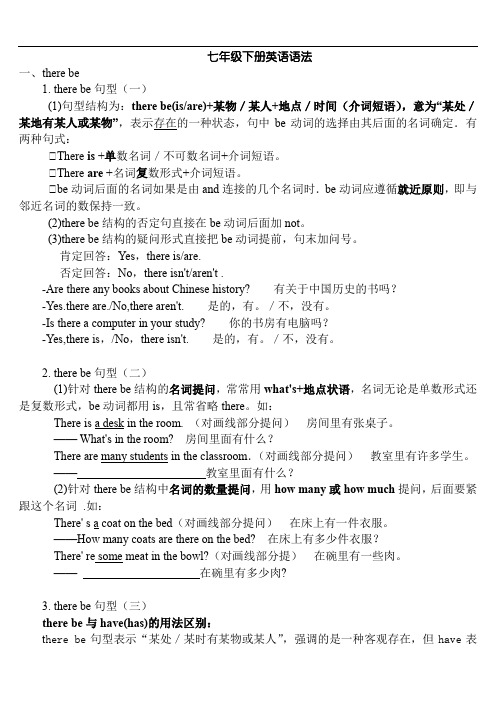
七年级下册英语语法一、there be1. there be句型(一)(1)句型结构为:there be(is/are)+某物/某人+地点/时间(介词短语),意为“某处/某地有某人或某物”,表示存在的一种状态,句中be动词的选择由其后面的名词确定.有两种句式:①There is +单数名词/不可数名词+介词短语。
①There are +名词复数形式+介词短语。
①be动词后面的名词如果是由and连接的几个名词时.be动词应遵循就近原则,即与邻近名词的数保持一致。
(2)there be结构的否定句直接在be动词后面加not。
(3)there be结构的疑问形式直接把be动词提前,句末加问号。
肯定回答:Yes,there is/are.否定回答:No,there isn't/aren't .-Are there any books about Chinese history? 有关于中国历史的书吗?-Yes.there are./No,there aren't. 是的,有。
/不,没有。
-Is there a computer in your study? 你的书房有电脑吗?-Yes,there is,/No,there isn't. 是的,有。
/不,没有。
2. there be句型(二)(1)针对there be结构的名词提问,常常用what's+地点状语,名词无论是单数形式还是复数形式,be动词都用is,且常省略there。
如:There is a desk in the room. (对画线部分提问)房间里有张桌子。
—— What's in the room? 房间里面有什么?There are many students in the classroom.(对画线部分提问)教室里有许多学生。
—— 教室里面有什么?(2)针对there be结构中名词的数量提问,用how many或how much提问,后面要紧跟这个名词.如:There' s a coat on the bed(对画线部分提问)在床上有一件衣服。
英语七年级下册知识点总结归纳(仁爱版)

英语七年级下册知识点总结归纳(仁爱版)英语七年级下册知识点总结归纳(仁爱版)(仁爱版)英语七年级下册知识点归纳Unit?5?Topic1重点语法一般现在时(常与频度副词?__________?________?________?______________?________?__________重点句型—How?do?you?usually?e?to?school?—I?usually?e?to?school?by?subway.—How?often?do?you?go?to?the?library?—Once/Twice/Three?times?a?week/Very?often/Every?day/Sedom 重点详解1.I?always?e?to?school?by?bus.by+交通工具名称on/in?+?a,?the,?my?等限定词+交通工具on?the?train=by?train on?his?bike=by?bikein?my?car=by?car.on?foot?___________go?to…on?foot=?walk?toI?often?go?to?school?on?foot.?=I?often?walk?to?school.go?to….by?bike?=?ride?a?bike?togo?to….?by?car?=?drive?a?car?togo?to?…?by?plane?=?fly?togo?to…?by?bus?=?take?a?bus?to2?.e?on!?It’s?time?for?class.e?on?___________?________________It’s?time?for?sth.=?It’s?tim e?to?do?sth.___________ ____________________3?.look?的短语 look?the?same________________look?like________________look?for_____________________look?after_______________4?.do?one’s?homework______________?(注意:one’s?要随主语的变化而变化______________________)。
初一下英语知识点总结归纳仁爱版

初一下英语知识点总结归纳仁爱版初一下英语知识点总结归纳(仁爱版)在初中英语学习的过程中,我们会涉及到很多的知识点,这些知识点对于我们的英语学习起到了至关重要的作用。
在本文中,我将对初一下学期所学习的英语知识点进行总结和归纳,以帮助大家更好地掌握和复习这些知识。
一、词汇1. 常用动词在初一下学期的英语学习中,我们学习了一些常用的动词,如:study(学习),listen(听),speak(说话),read(阅读)等。
2. 数字和时间我们学习了英语中的基本数字和表示时间的表达方式。
例如,one (一),two(二),three(三)等,以及表示时间的词汇和短语,如:year(年),month(月),hour(小时),in the morning(在早上)等。
3. 人称代词初一下学期中,我们掌握了一些基本的人称代词,如:I(我),you(你),he(他),she(她)等。
这些代词在交流和句子构成中起到了重要的作用。
4. 学科词汇我们在英语学习中学习了一些与学科有关的词汇,如:math(数学),science(科学),history(历史)等。
这些词汇有助于我们更好地学习和理解各个学科的知识。
二、语法1. 简单现在时初一下学期中,我们学习了英语中的简单现在时。
它用于描述经常性的动作、现实存在的状态等。
例如,I like playing basketball.(我喜欢打篮球。
)2. 一般疑问句我们学会了如何构成一般疑问句,并用适当的助动词将其转换为疑问句。
例如,Do you like swimming?(你喜欢游泳吗?)3. 介词的用法在初一下学期中,我们学习了一些常用介词的用法,如:in(在…里面),on(在…上面),at(在…处)等。
介词在句子中起到了连接作用,并且对句子的意义起到了修饰和限制的作用。
4. 不定代词我们学会了一些常用的不定代词,如:some(一些),any(任何),no(没有),every(每个)等。
仁爱版英语七年级下全部知识点总结
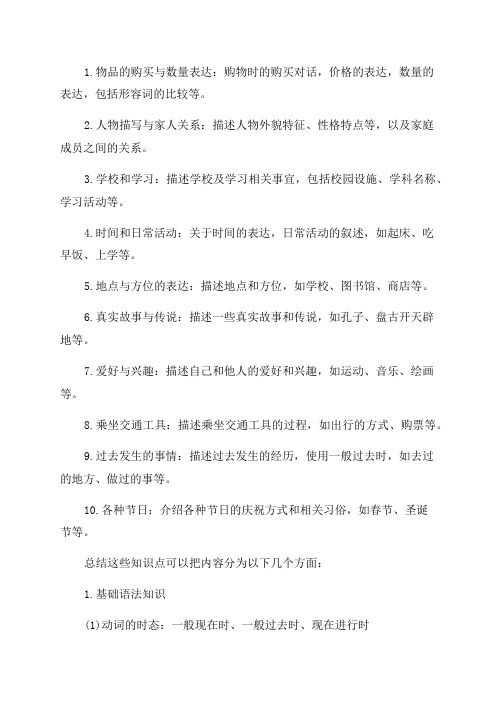
1.物品的购买与数量表达:购物时的购买对话,价格的表达,数量的表达,包括形容词的比较等。
2.人物描写与家人关系:描述人物外貌特征、性格特点等,以及家庭成员之间的关系。
3.学校和学习:描述学校及学习相关事宜,包括校园设施、学科名称、学习活动等。
4.时间和日常活动:关于时间的表达,日常活动的叙述,如起床、吃早饭、上学等。
5.地点与方位的表达:描述地点和方位,如学校、图书馆、商店等。
6.真实故事与传说:描述一些真实故事和传说,如孔子、盘古开天辟地等。
7.爱好与兴趣:描述自己和他人的爱好和兴趣,如运动、音乐、绘画等。
8.乘坐交通工具:描述乘坐交通工具的过程,如出行的方式、购票等。
9.过去发生的事情:描述过去发生的经历,使用一般过去时,如去过的地方、做过的事等。
10.各种节日:介绍各种节日的庆祝方式和相关习俗,如春节、圣诞节等。
总结这些知识点可以把内容分为以下几个方面:1.基础语法知识(1)动词的时态:一般现在时、一般过去时、现在进行时(2)名词的单复数形式(3)形容词的比较级和最高级(4)数字的表达(5)介词的使用(6)副词的使用2.日常生活用语(1)询问价格和回答价格(2)询问数量和回答数量(3)询问和描述外貌特征(4)描述家人关系和家人的特点(5)描述学校设施和学科名称(6)描述日常活动和时间(7)描述地点和方位(8)描述爱好和兴趣(9)描述交通工具和乘坐方式(10)描述过去发生的事情3.文化和传统(1)描述真实故事和传说(2)介绍节日的庆祝方式和相关习俗通过掌握这些知识点,可以在仁爱版英语七年级下册的学习中更加轻松地理解和应用相关内容,提高自己的英语能力。
- 1、下载文档前请自行甄别文档内容的完整性,平台不提供额外的编辑、内容补充、找答案等附加服务。
- 2、"仅部分预览"的文档,不可在线预览部分如存在完整性等问题,可反馈申请退款(可完整预览的文档不适用该条件!)。
- 3、如文档侵犯您的权益,请联系客服反馈,我们会尽快为您处理(人工客服工作时间:9:00-18:30)。
七年级下英语知识点总结Unit 5 Topic1㈠短语总结1.在学校大门口at the school gate2.来学校come to school3.去学校go to school4.上课have class / have classes5.步行on foot6.骑自行车ride a bike/ ride bikes/ by bike / on a bike7.坐公交by bus / take a bus8.坐地铁by subway / take the subway / on the subway9.坐飞机by plane/ take the plane / on the plane10.坐小汽车by car / in a car/ take a car/ drive a car11.坐轮船by ship12.坐小船by boat13.坐火车by train / on the train14.在我们组in our group15.一群学生 a group of students16.我们中的三个人three of us17.在平日on weekdays18.在周末on the weekends / at weekends19.起床get up20.睡觉go to bed21.早起get up early22.回家go home23.到家get home24.去动物园go to the zoo25.去公园go to the park26.看电影see a movie / film27.看电视watch TV28.在晚上in the evening / at night29.帮助父母help parents30.做某人的家庭作业do one’s ( my/ her/ his/ your/ their) homework31.在学校at school32.知道,了解know about / learn about33.校园生活school life34.一个美国学生an American student35.在美国in America / in the U.S.A.36.许多学生many students/ a lot of students/ lots of students37.很少very few38.吃午饭have lunch39.出去吃饭eat out40.在校期间on school days41.休息一会have a short rest / break42.午饭后after lunch43.在某人的业余时间in one’s ( my/ his/ her/ their…)free/ spare time44.打篮球play basketball45.踢足球play soccer / football46.弹钢琴play the piano47.弹吉他play the guitar48.拉二胡play erhu49.去游泳go swimming / go for a swim50.去划船go boating51.球赛a ball game / ball games52.一年四次four times a year53.听音乐listen to music54.读书read books55.看报read newspapers56.看医生see a doctor57.去图书馆go to the library58.一周两次twice a week59.见朋友meet friends60.每天every day61.在七点半at half past seven62.一小会for a little while / for a short time63.晚饭后after supper64.吃饭have dinner65.吃早饭have breakfast重点句型Happy New Year! The same to you.Your new bike looks very nice. Thank you.How do you usually come to school? —I usually come to school by subway.How often do you go to the library?—Once/Twice/Three times a week/Very often/Every day/SedomThe early bird catches the work. (谚语) 笨鸟先飞Work / Study must come first. 工作/ 学习必须放在第一位!Classes begin at eight. =Class begins at eight.What time does the class begin? / What time do the classes begin?We have no more time. 我们没有更多的时间了。
I have four classes in the morning and two in the afternoon.我早上上四节课,下午上两节。
She goes to bed at about a quarter to ten. 她九点四十五分睡觉。
a, the, my 等on.take the bus/car)on the bus/ train/ship/plane)on a bike/motorbikein a car/taxi)in my car=by carPeople show love to their mothers by giving cards.巧辩异同on foot “走路”,是介词短语,不能作谓语,只作方式状语,位于句2.3. 感官动词,系动词Her dress looks very nice. You look very cool in this coat.look的短语look the same看起来一样look like看起来像……look for寻找look after =take care of 照顾,照料look around/about四处看看,四下环顾; look back回头看;回顾;look out 当心,小心,留神; look through浏览,仔细查看;look up查寻,查阅;抬头看4. do one’s homework 做家庭作业(注:one’s 要随主语的变化而变化,常用形容词性物主代词my, your, their, our, his, her等)。
do my homework at school 在学校做作业5. want to do sth.“想做某事”,want 后接动词不定式作宾语。
know about“了解,知道关于…”。
we want to......... the school life of American students....... know about我们想了解一下美国学生的学校生活。
6;一点,一些;,几乎没有;一点,一些;(否定)很少,几乎没有用,都表示“几乎没有强调有一些。
e.g.He has a few friends. 他有几个朋友。
He has few friends. 他几乎没有朋友。
e.g. I can speak only a little Chinese. They has little money. 他们没有什麽钱a little 与little 也可以用作副词,表示“有点”“稍稍” 表示“很少”e.g. Can you speak English? ---Yes, but only a little.This book is a little more difficult than that one. (可修饰形容词比较级)She slept little last night. 昨天晚上,她没有怎么睡觉。
7. go+v.-ing 表示去做某事,类似:go fishing 去钓鱼go shopping 去买东西go skating 去滑冰go swimming 去游泳.................. and so on8. (1).always> usually>often> sometimes>seldom>never等或单位时间内的次数,表示频率的短语:次数+单位时间e.g. : once a week一周一次twice a month每月两次three times a year每年三次How often do you go to the library?你多久去一次图书馆?(2--(3)/About 500 km.(4,主要用来表示对将来一段时间的提问。
常用来回答。
9. What time is the class over?10What time does the class begin?本身为分词,只能用begin to do sth He is beginning to run.11. ,hear 听见(结果)冠词用法1. 弹乐器前要带定冠词the,而进行球类运动则不带the。
play +棋类/球类/牌下……棋,打……球play soccer/basketballplay the +西洋乐器弹/拉……乐器play the guitar/piano2.序数词,前面要用定冠词the。
on the second floor3.三餐前面不用冠词。
have breakfast/lunch/supper一般现在时语法讲解一般现在时表示:(常与频度副词never, seldom, sometimes, often, usually, always等连用)(1)现在所处的状态。
Jane is at school.(2)经常或习惯性的动作。
I often go to school by bus.(3)主语具备的性格和能力。
He likes playing football.(4)客观真理。
The earth goes round the sun.常用的时间状语:often, always, usually, sometimes, every day等等。
行为动词的一般现在时,助动词是do/don’t和does/doesn’t.当主语是第一、二人称和所有复数形式时,行为动词用原形。
肯定式:I go to school on foot. 否定式:I don’t go to school on foot.疑问式:Do you go to school on foot? —Yes, I do. —No, I don’t.当主语是第三人称单数时,动词用第三人称单数形式,在词尾加-s或-es。
